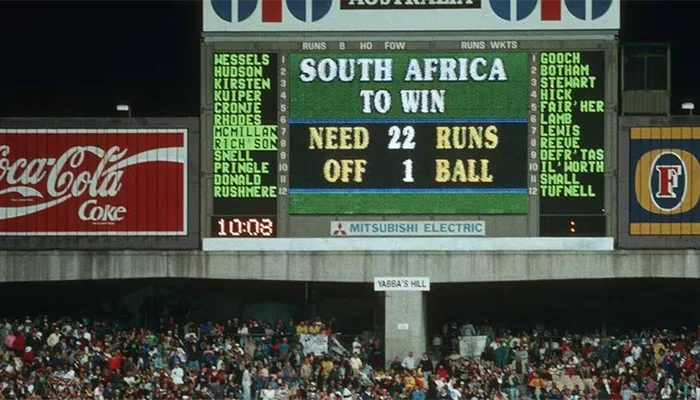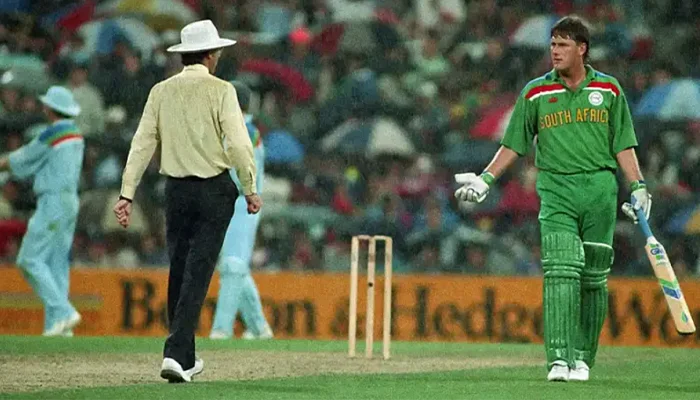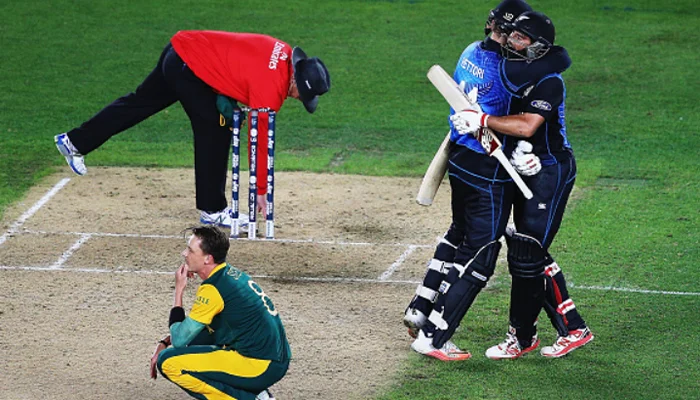The Day South Africa Earned the 'Chokers' Tag

(Scoreboard of the match between England and South Africa in the 1992 World Cup)
South Africa and the tag of chokers, looks like a story made in heaven. In the game of cricket, there are two types of teams; one is like the Australian team which always shines under pressure and is one of the most successful teams while the second one is the South African team that always chokes under pressure and hence has hardly got their name on the ICC trophies. But do you know how South Africa got the tag of chokers? Well, it was the day of 22nd March 1992, when South Africa choked for the first time in a mega event and hence the tag of chokers was awarded to them for the first time.
1992 World Cup Semi-Finals: England vs South Africa
The 1992 ODI World Cup was an event that took place in Australia and the 2nd Semi-Finals of the event was scheduled at the ground of Sydney between South Africa and England. Both the teams performed well in the group stage and hence had the chance of making it to the Finals of the World Cup. At the Sydney Cricket Ground, South Africa went to field first and it was the England team that came out to bat and put up a total first.
However, England didn’t start well and they lost early wickets to the South African team. But a partnership between Alec Stewart and Graeme Hick ensured that England reached a safe total in the big game and they finished at 252 runs with the loss of 6 wickets in 45 overs. From the South African team, it was Meyrick Pringle who picked up 2 wickets from his 9 overs while from the England team, Graeme Hick got 83 runs in his innings and hence the match was set for a thriller now.
|
England vs South Africa, 2nd Semi-Final at Sydney, Mar 22 1992, Benson & Hedges World Cup |
|
|
England |
South Africa |
|
252/6 (45 overs) |
232/6 (43 overs) |
|
Graeme Hick 83 (90) |
Andrew Hudson 46 (52) |
|
Meyrick Pringle 2/36 (9 overs) |
Richard Illingworth 2/46 (10 overs) |
|
England won by 19 runs |
|
Talking about the South African batting, they started the run chase well but were losing wickets on a regular basis. Andrew Hudson batted well and got to 46 runs from just 52 balls before being dismissed by Richard Illingworth. South Africa was cruising towards the target well but there were regular interruptions because of the rain. At the end of the match, South Africa was in need of just 22 runs from the 13 balls when rain interrupted and it was a longer break than expected.

(South African players were dejected after losing the 1992 World Cup Semi-Finals)
However, when the players returned to the field, they were told that after some bizarre calculations, South Africa needed to score 22 runs from a single ball which wasn’t even possible if the cricketing rules were taken into consideration. South Africa's shocking loss in the semifinal left everyone baffled, as the bizarre calculation led to their defeat in their first semi-final.
Instances of South Africa Choking on the Big Stage
After getting knocked out of the 1992 World Cup, South Africa made it a habit of choking on the big stages and it was quite evident from the upcoming matches that the fans saw live. It was the 1999 ODI World Cup where South Africa lost the Semi-Finals and it was the Australian team that qualified for the next round. In the chase for 214 runs, South African player Lance Klusener scored quickly, bringing hope to his team. He hit two fours off Fleming's bowling in the final over. However, the pressure from Australia intensified. Klusener refused a single, creating confusion with Allan Donald. Eventually, a run-out occurred, tying the match. Despite Klusener's efforts, South Africa missed out on the final due to a better net run rate for Australia. The unexpected outcome left South Africa and their fans disappointed.
Just like their 1992 ODI World Cup campaign, the 2003 ODI World Cup match was also affected by the rain when the South African team was playing against Sri Lanka and the rain interrupted their run chase against them. With Mark Boucher at the crease, the message was that they need at least a single on the last ball to have a better net run rate than Sri Lanka and hence they will qualify for the next round. However, there was a miscommunication on their side and Boucher's decision to play a dot ball dashed their hopes. Subsequently, rain intervened, rendering further play impossible. Consequently, the match ended in a tie, and South Africa faced yet another defeat in a must-win game. The frustration was palpable as the Proteas found themselves unable to clinch victory despite being within touching distance.

(Dale Steyn sits in disbelief after New Zealand knocked them out of the 2015 ODI World Cup)
The 2015 ODI World Cup semi-finals is another story of heartbreak for the South African team when rain affected their chances again to enter the Finals of the tournament. However, it was the story of dropped catches, poor fielding, and an unlucky day for the South African team that gave New Zealand an edge. New Zealand was able to chase a target of 298 runs from their 43 overs and hence went on with Grant Elliott's innings who managed to score 84 runs from just 73 balls and thus shattering the dreams of one of the best South African teams ever.
Coming to the 2023 ODI World Cup, South Africa’s latest choke was against the Australian team in the Semi-Finals when they failed to defend the target of 212 runs from the 50 overs of the game. While batting first, it was David Miller who pushed the South African team to a positive total with his century. In reply, Australia started well with David Warner and Travis Head but soon lost the plot as South Africa attacked with their spin department. However, the poor catching and some failed decisions allowed the Australian team to chase the target and qualify for the Finals.

Comments
Sign up or log in to your account to leave comments and reactions
0 Comments